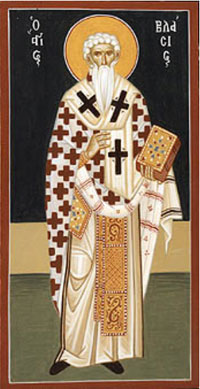
It is not known precisely when or where St. Blaise lived, but according to tradition he was a bishop of Sebaste, Armenia, in the early part of the fourth century, and suffered martyrdom under the Roman emperor Licinius, who had commanded the governor of the province, one Agricolaus, to prevent the spread of Christianity in his territory. After this edict had been promulgated, Blaise fled to the mountains and lived in a cave frequented by wild beasts. He used his skill to heal the animals that he found wounded or sick, and when the emperor's hunters, bent on collecting wild animals for the royal games, discovered him in this cave, they carried him off to Agricolaus as a special prize.
On the way, the story goes, they met a poor woman whose pig had been seized by a wolf. At the command of Blaise, the wolf restored the pig to its owner, alive and unhurt. During the course of this journey he also miraculously cured a child who was choking to death on a fishbone. For this reason St. Blaise is often invoked by persons suffering from throat trouble. When he had reached the capital and was in prison awaiting execution, the old woman whose pig he had saved came to see him, bringing two fine wax candles to dispel the gloom of his dark cell. When he was finally killed, he is supposed to have been tortured with an iron comb or rake, and afterwards beheaded. In the West there was no cult honoring St. Blaise prior to the eighth century.
One of the Fourteen Holy Helpers, his emblems are an iron comb and a wax taper.
One reason for St. Blaise's popularity arose from the fact he was a physician who cured, even performing miraculous cures. Thereby, those who were sick, especially with throat ailments, invoked his intercession. Eventually the custom of the blessing of throats arose, whereby the priest held two crossed candles over the heads of the faithful or touched their throats with them while he invoked the prayer of the saint and imparted God's blessing. In our present Roman Ritual, the priest prays, "Through the intercession of St. Blaise, bishop and martyr, may God deliver you from every disease of the throat and from every other illness, in the name of the Father, and of the Son, and of the Holy Spirit." This practice continues in many parishes on St. Blaise's feast day.
While we invoke St. Blaise for his protection against any physical ailment of the throat, we should also ask his protection against any spiritual ailment - profanity, cursing, unkind remarks, detraction or gossip. St. James reminds us, "If a man who does not control his tongue imagines that he is devout, he is self-deceived; his worship is pointless" (1:26) and later, "We use [the tongue] to say, 'Praised be the Lord and Father'; then we use it to curse men, though they are made in the likeness of God. Blessing and curse come out of the same mouth. This ought not to be, my brothers!" (3:9-10). Therefore, may St. Blaise protect us from all evil, physical and spiritual, which may attack the throat.









No comments:
Post a Comment